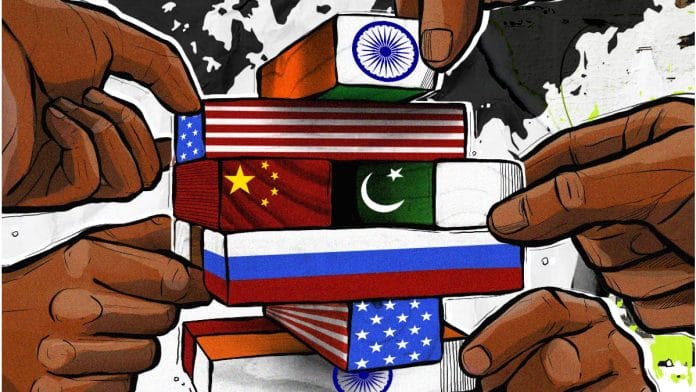Thank you dear subscribers, we are overwhelmed with your response.
Your Turn is a unique section from ThePrint featuring points of view from its subscribers. If you are a subscriber, have a point of view, please send it to us. If not, do subscribe here: https://theprint.in/
“There are decades where nothing happens; and there are weeks where decades happen” if this famous quote by Lenin has any relevance it could very well be now. The current US administration attempt to upend the world order it build over decades cannot be categorized anything but a type of revolution. Abandoning an ally in the midst of its war for survival, starting trade wars with its neighbors, threating to take over Panama Canal, Greenland from Denmark, and walking out of UN organizations which the US helped found. As Fareed Zakaria points out, “The United States spent eight decades building an international system of rules, norms and values that has produced the longest period of great power peace and global prosperity in human history. Its alliances are the greatest force multiplier for its influence around the world.”
This dramatic policy shifts has led to much consternation especially in Europe where there are growing calls for embarking on a large-scale military rearmament to better fend for itself while also finding a way to support Ukraine against Putin’s Russia who is determined to reduce US/NATO influence in the region. But this won’t be easy to begin with as the Economist notes, “Many European countries would struggle to produce a single combat-capable brigade each. A British deployment to Ukraine, for instance, would probably swallow up units already earmarked for NATO, leaving holes in the alliance’s war plans.” For Europe to be able to credibly defend themselves they will have to spend about 3.5% of GDP as a collective bloc against the present 1.8%, money for that will have to come from somewhere, most likely cuts to its welfare programs, reduction in aid to poorer countries and increase debt. And even if they agree, it will take years to build the military strength and quantity.
The picture isn’t looking much better in Asia where the likes of Taiwan, Japan, Philippines, and even India would be watching closely and some what anxiously against their main adversary in China with whom they all have land/maritime boundary disputes. Their militaries are currently no match in terms of firepower against China which currently has the world’s second largest military budget and is carrying out a rapid modernization and expansion of its military. Would a Japan think of building nukes for protection? Tomorrow maybe even South Korea against Kim’s North? If the US can abandon its ally in Europe in the middle of a war, what trust will they have in future that a different administration won’t repeat such an act.
The Yalta Conference, held in February 1945, was a pivotal moment in world history. The leaders of the Allied powers—Franklin D. Roosevelt of the United States, Winston Churchill of the United Kingdom, and Joseph Stalin of the Soviet Union—gathered to discuss the post-World War II reorganization of Europe and the fate of various nations. It led to the division of Germany, Soviet Union having its of sphere of influence across its region and control over its ‘republics’ and a cold war. It serves as a reminder of the pitfalls of allowing a few dominant powers to dictate the terms of global order.
These pieces are being published as they have been received – they have not been edited/fact-checked by ThePrint.


